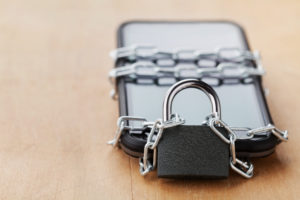If a person is questioned as a suspect to a crime and the police tell said suspect that they need access to their phone, does the suspect have to give it? The answer to this question is not as easy as it should be. We live in a changing legal landscape that has not caught up to current technology in many ways.
The short answer is that we recommend contacting a criminal defense attorney before giving the police access to your phone – even if you have nothing to hide. While it is potentially possible that they could get a warrant that gives them access to your phone, they do not have a legal right to access your phone without said warrant.
The Fourth Amendment Prohibits Warrantless Search and Seizure
One factor that affects this question is the Fourth Amendment, which requires that law enforcement have a search warrant to search a suspect’s property, or the consent of the owner. On one hand, this does mean that if a police officer has a warrant to search your home, then they can legally do so.
However, it is not quite that simple due to the Fifth Amendment. If a phone is locked and the police request that the suspect unlock their phone, and the suspect knows there is incriminating evidence on their phone, then the police could essentially be asking the suspect to incriminate themselves. The Fifth Amendment makes it clear that a person has the right not to incriminate themselves. In short, if you are the only one that knows the passcode to your phone, it is possible to make a legal case that you cannot be forced to give that passcode to anyone else – police or otherwise.
The Rules Are Different for Phones Locked with Facial Recognition or Fingerprints
If your phone is locked with your fingerprint or facial recognition, then there is a different legal issue involved. The Supreme Court has repeatedly upheld that the protections offered by the Fifth Amendment do not extend to physical evidence such as hair, fingerprints, etc. As a result, if the phone is locked only with biometric data then the police can potentially force you to unlock your phone.
This is a Changing Legal Issue
While the above is all factual, it is important to know that none of this is set in stone. Cases are being heard and appealed regularly that involve these issues. The best advice is that if you are being asked to give the police access to your cellphone, contact Law Office of Michael L. Fell at (949) 585-9055 for a free legal consultation. We will carefully asses your case to find the best way forward.


